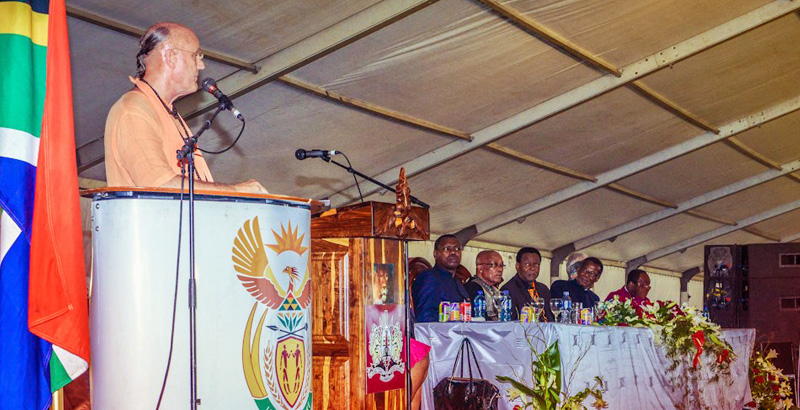By Indradyumna Swami
February 1, 2013

Your Majesty King Goodwill Zwelithini, Your Excellency President Jacob Zuma, Distinguished KZN Premier Dr Zweli Mkhize, ministers and government officials, ladies and gentlemen;
Thank you for the opportunity to speak before you today. I will get straight to the point. There is no need to elaborate on South Africa’s social ills: each of us in our own way has felt the repression, aggression and frustration of living in a society split by ethnic, tribal, religious, econo-mic and political divisions. In our heart of hearts each of us desires a truly cohesive society that respects the rights of all others and works as a united body.
My humble proposal today is based on the teachings of the sacred texts of India: it is that social cohesion will be achieved only when we stop seeing our differences and recognize what we have in common. But what do we have in common in a country where language, economic situation, religion and skin color differs so radically from person to person? What we have in common is that we all created by the same God. Think about this for a moment: if we are all created by God, then we have a common father. If two people have the same father they are brother and sister. If four people have the same father they are brothers and sisters. And if fifty million people have the same father they are brothers and sisters. My point is that we are all brothers and sisters here in South Africa. God the Father is the common denominator, the cohesive factor uniting the people of this county.
But one may ask: which God is the common father? The Christian God? The Muslim God? The Hindu God? The Jewish God? No. Just as there is one sun that is known by different names in different parts of the world, God is know by different names such as Christ, Allah, Adonai, Krsna and Un-kulun kula. It is important to understand this, for to achieve perfect social cohesion we must transcend even our religious differences. In other words, we must unite on the spiritual platform by realizing we are all part of the greater family of God. There is a saying about family attachment: “Blood is thicker than water.” If we understand that God is the Supreme Father and that we are all his children, the bond between us will be unbreakable.
Another important point is that when we recognize our common identity, our differences will complement each other. In a symphony orchestra the individual instruments are distinctly different but when they play together under the direction of the conductor the effect is simply wonderful. In the same way, when we respect our differences as Africans, whites, coloreds and Indians while realizing our common identity as eternal servants of God, the supreme conductor, there will be social cohesion in South Africa.
We try to demonstrate this principle in the Hare Krsna movement by propagating the chanting of God’s names in public. One tangible result is that in any number of our centers around the country there are now micro-societies of Africans, whites, coloreds and Indians living together in perfect harmony. We want to share this good fortune with others and we try to do so on a daily basis by breaking down social barriers in a practical way. For example, for the past twenty-four years our movement has distributed tens of millions of plates of hot, nutritious food in low income areas such as the outlying towns and villages of Kwazulu Natal. Our pledge today is to work together with others to achieve nothing short of a “Hunger-Free South Africa.” When the children of this land are fed they can concentrate on their education, and with education comes career and stability. When there is stability in the lives of the citizens there is less crime and violence; people are more likely to treat one another with generosity and to see each other’s commonalities.
We are also attempting to achieve social cohesion by organizing a grand cultural event called the Festival of the Chariots on the Durban beach-front over the Easter weekend in late March. The theme of the festival is similar to the one promoted by today’s program: “Culturally many, spiritually one”. We encourage all ethnic and religious groups to participate in the seminars and to perform on the main stage. King Goodwill has already graciously accepted our invitation.
In conclusion, let us respect our differences and recognize our common bond as children of God so that we may truly become the Rainbow Nation, a nation of different colors and cultures that is united on the spiritual platform. It is said that there is a pot of gold at the end of every rainbow. In a country like South Africa that is blessed with so much diversity, culture and religion, that pot of gold will be the respect we show for each other and the sense of national pride that will flow forth when we finally recognize that we are all brother and sisters.
By solving South Africa’s social ailments, the citizens of this great country can one day stand united as an example for the whole world. It is possible. It not a dream. It is not a fantasy for the Vedas say, vasudhaiva kutumbakam: “The whole world is but one family.”
May God bless you all. May God bless South Africa. Hare Krishna.